Sunday Morning! “In the Shadow of Young Girls in Flower” by Marcel Proust
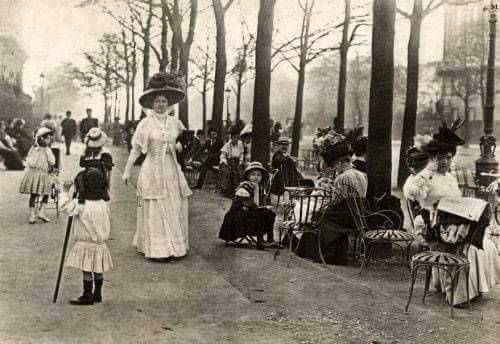
[Note: We’ve been reading our way through Proust’s masterpiece In Search of Lost Time. Previous posts: 1, 2, and 3 ]
When I was a freshman in high school, a girl who lived in our neighborhood showed me her underpants during the bus ride home. She and her brother were considered snobs, probably because they came from money more obviously than anyone else in our class, and she certainly never would have talked to me; not even were I saving her from a burning building. Nevertheless, during one fateful bus ride, while I sat in the seat beside hers, and thus shielded from everyone else’s view, she hiked her skirt up very slowly all the way past her waist, giving me a fairly good long view, sneering the whole time.
I couldn’t possibly tell you anything else that happened that year, aside from the fateful Panty Incident, and yet that bus ride is still carved fairly deeply into the otherwise blank slate of my adolescent memory. I have also seen more than a few women in underpants since then, and very few have made such a distinct impression on me. When you are at that age, something like that is The Most Important Thing That Ever Happened in your young life. In general, the intensity of every wonderful or horrible thing that happens in adolescence will probably never be equalled.
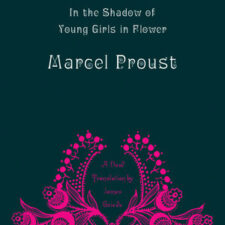 Certainly, for Proust’s young narrator, now an adolescent, every single thing the young women around him do has become all important by the second Volume of In Search of Lost Time, aptly entitled “A l’ombre des jeunes filles en fleurs.” Like many of Proust’s titles, it works better in French; the slightly awkward English translation would be something like “In the Shadow of Young Girls in Flower,” or let’s call them “blossoming young women”; they’re everywhere and they’re a little overwhelming for our hero! Especially, one young girl in particular: Gilberte, the loving daughter of Charles and Odette Swann, who are now married.
Certainly, for Proust’s young narrator, now an adolescent, every single thing the young women around him do has become all important by the second Volume of In Search of Lost Time, aptly entitled “A l’ombre des jeunes filles en fleurs.” Like many of Proust’s titles, it works better in French; the slightly awkward English translation would be something like “In the Shadow of Young Girls in Flower,” or let’s call them “blossoming young women”; they’re everywhere and they’re a little overwhelming for our hero! Especially, one young girl in particular: Gilberte, the loving daughter of Charles and Odette Swann, who are now married.
Just a brief note here: the narrator is only named once in “À la recherche du temps perdu” and that’s in a fairly cheeky way; Proust says that the reader will likely think his narrator has the same name as the author, so we might as well call him “Marcel.” As a result, when people discuss the books, they tend to call him “the narrator,” “Marcel,” or “Me”. The least-awkward of these, in my opinion, is “Marcel,” so I will be using that one more often.
Marcel is a bit older in Vol. 2 and the people around him seem to have all changed in some way. In fact, Proust notes, it is characteristic of youth that our representations of things and assessment of their value are ever-changing in a way that “make one’s youth as fabulous as the metamorphoses of Ovid.” The artist we imagine must be the greatest of all time looks a few years later like a pisher. Our favorite novelist in freshman year seems kind of corny when we’re seniors; at one point, I was sure no writer would ever top Stephen King. The crush we imagined to be supernaturally attractive and charming later strikes us dull as dishwater. The life we imagined we must lead later in adulthood doesn’t pan out.
And, in fact, we become different people. Proust is fascinated how our Self is really a progression of one “me” replacing another, like frames of a motion picture. Everyone has changed slightly in each other’s eyes since the last volume. The somewhat corny doctor Cottard is a respected physician in the eyes of young med students. Swann has taken on a “new personality” in the eyes of society: “that of Odette’s husband.” He has come down in the world a bit and grown a bit snobbish as a result and become a bit of a name-dropper; Odette, in turn, has grown more noticeably fond of her husband, doting on him even while cuckolding him. It’s perhaps not the arrangement for everyone, but they seem to have settled into a sort of marital détente around the shared territory of their beloved daughter.
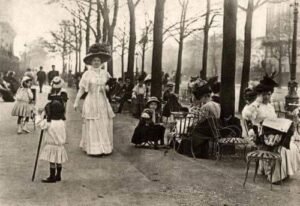 And Marcel has been infatuated by Gilberte since he saw her from the path leading past the Swann’s house in Combray. Now in Paris, he encounters her regularly walking on the Avenue des Champs–Élysées. They start playing together and he wants to start visiting their house, but her parents don’t think very much of him. Marcel writes a letter to her father to defend himself, but to no avail. When Gilberte brings the letter back to Marcel, they wrestle playfully for it and, in the process of rolling around against each other, he has an orgasm. She says they might wrestle some more… He is now hopelessly enamored.
And Marcel has been infatuated by Gilberte since he saw her from the path leading past the Swann’s house in Combray. Now in Paris, he encounters her regularly walking on the Avenue des Champs–Élysées. They start playing together and he wants to start visiting their house, but her parents don’t think very much of him. Marcel writes a letter to her father to defend himself, but to no avail. When Gilberte brings the letter back to Marcel, they wrestle playfully for it and, in the process of rolling around against each other, he has an orgasm. She says they might wrestle some more… He is now hopelessly enamored.
And the Swanns’ opinion of Marcel changes just as quickly when they hear doctor Cottard speak highly of him. The boy is brought into the strangely cloistered world of their home and profits from the experience. His views of the world, art, their daughter, and literature all change.
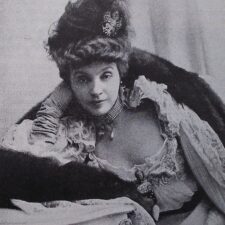 In a sense, the first half of this volume is about Marcel seeing up close things he’s worshipped from afar and watching them shrink in his perception. He finally gets the chance to see the great actress “la Berma” appear on stage in a performance of Racine’s “Phèdre.” His parents had previously forbidden their high-strung son from attending the theatre, and he could only imagine this legendary performer- likely based on the legendary Gabrielle Réjane, once called the “soul” of Paris. When he sees la Berma on stage, he is… a little underwhelmed. Nevertheless, he is in the minority; after his father’s colleague, the diplomat Norpois, assures Marcel her performance was highly acclaimed; his memory of it changes. I was reminded here of bands or movies I waited for impatiently as a teen, only to be invariably disappointed by them, and the ones I came around on later.
In a sense, the first half of this volume is about Marcel seeing up close things he’s worshipped from afar and watching them shrink in his perception. He finally gets the chance to see the great actress “la Berma” appear on stage in a performance of Racine’s “Phèdre.” His parents had previously forbidden their high-strung son from attending the theatre, and he could only imagine this legendary performer- likely based on the legendary Gabrielle Réjane, once called the “soul” of Paris. When he sees la Berma on stage, he is… a little underwhelmed. Nevertheless, he is in the minority; after his father’s colleague, the diplomat Norpois, assures Marcel her performance was highly acclaimed; his memory of it changes. I was reminded here of bands or movies I waited for impatiently as a teen, only to be invariably disappointed by them, and the ones I came around on later.
Similarly, we will remember that Marcel’s great dream is to one day write like the famous “Bergotte,” a novelist based, it seems, on both Anatole France and the philosopher Henri Bergson. Proust never lets us read any of the passages written by this fictional novelist, but we know he is famous as a prose stylist; his sentences are melodious and poetic; they contain a harmonious flow of images, with something unexpected about their construction, and a priceless element of truth at their core. We get the feeling too that Bergotte can write a sentence like a Fabergé egg without it actually meaning anything, a trick fairly easy to pull off in French. Nevertheless, a craftsman with words, Bergotte has many imitators, but they all lack his element of creative genius.
When the boy finally gets to meet the great writer at one of Mme Swann’s luncheons, the heroic man of letters he has constructed in his mind is replaced by a rather squat figure with a “snail shell nose and goatee beard,” whose speech lacks the luminosity of his prose. Here, Proust is likely thinking of France, who he met at a salon when he was eighteen. Like Anatole France, Bergotte is also known for his dissolute ways, seen as hypocritical given the moral goodness of his books. Similarly, he is no paragon of fidelity. Proust disagrees sharply with the notion that an immoral man cannot make moral art, offering a colorful analogy that I quite like:
As the great Doctors of the Church began often, while remaining good, by experiencing the sins of mankind, out of which they drew their own personal sanctity, so great artists often, while being wicked, make use of their vices in order to arrive at a conception of the moral law that is binding upon us all.
Over time, he comes to see that Bergotte is just as brilliant in real life, but saves his energy for his books. Marcel should learn from this to withdraw from this pretty world of society and write, but he hasn’t as of yet. Even worse, Norpois encourages Marcel’s father to let him to allow him to pursue a literary life, but he also tells the boy that his prose just reads like Bergotte, who isn’t very good. Quelle horreur! The poor boy is still not ready to write; some have suggested that the quick way to “summarize Proust” is: “How Marcel learned to write.” Regardless, it is okay to hate Norpois. I hate Norpois.
As for Gilberte, the thrill of first love fades for Marcel. She is more interested in going dancing than spending time with him and he essentially resolves to evict her from his heart. “It was to a slow and painful suicide of that self which loved Gilberte,” and he is learning the painful truth that the many selves we shed throughout life are quickly replaced by new ones, like dead skin we slough off. The love that seemed key to our survival turned out to be ephemeral. And perhaps we never grieve like we do for the first. I still remember, when going through my hellish divorce, thinking “At least this isn’t as bad as that first time my heart was broken.”
Gradually, Marcel is realizing something important about how we live (and a great theme of Bergson, who we’ll get to in a bit):
I was not situated somewhere outside of Time, but was subject to its laws, just like those characters in novels who, for that reason, used to plunge me into such gloom, when I read of their lives, down at Combray, in the fastness of my hooded wicker chair. In theory, one is aware that the earth revolves, but in practice one does not perceive it, the ground upon which one treads seems not to move, and one can rest assured. So it is with Time in one’s life.
I think I am personally most aware of time when I get my hair cut and see more white hairs than ever piling up on the floor like dead days below me. Marcel is now coming to realize that his own story has already started and he’d better get to it. Luckily, we all still have a little time to read and reflect and relax, while the world keeps revolving beneath us.
So, what are YOU reading, pondering, playing, or falling in love with this weekend?

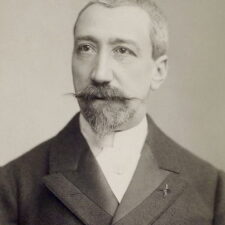

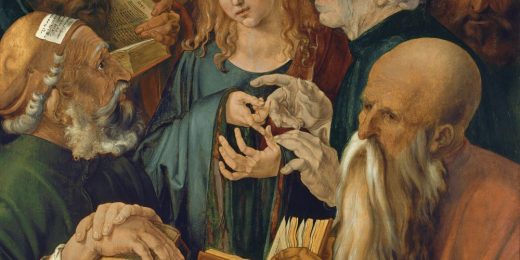



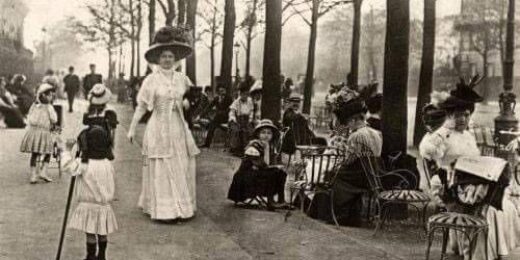














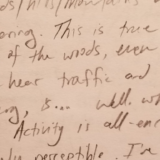







Every now and again, I look up names in the google as they occur to me.
I had a dream about a bully from 10th grade and, yep, she’s a gramma now. A dear friend from 8th grade is a carnivorous plant aficionado. (He’s got a beard? He wasn’t a beardy guy in 8th grade!)
Kids from when you were kids and you know better than to google for “Timmy” or “Jon Jon” but don’t remember if Tim was his middle name because his first name was his Dad’s or if the two Jons were short for John or Jonathan.
And Goodness help you if you want to look up someone with a first name from one of the Gospels and the last name that also happens to be an English word for a pre-computer profession. (Hey, we should have people whose last name is stuff like “Coder” or “Sysad”.)
And the faces that were so bright are now wrinkled. Maybe there’s a sparkle in the eyes that you remember from when you were singing in music class or when she made a great point in American History.
My friends who dreamed about saving the world (or running it) are now doing middle management jobs at middle companies and posting pictures of their kids to facebook and they might not have a sparkle anymore.
But, man, remember when *SHE* walked into the classroom and smiled? Not at you, at someone else, but smiled anyway?
Ah, jeez.Report
The first young woman who ever let me see her semi-naked was a friend’s older sister. They were a conservative Catholic family, but she’d moved to San Francisco a few years before and become a chiropractor. She’d gotten some piercings and was more liberal minded. So, she let me see her breasts. It was the 90s, okay? Still a huge deal in my young life.
I looked her up not too long ago. No, I wasn’t looking to hook up or anything, but wondered how she was doing. Very good it seems. The breasts are no more… He’s still a chiropractor and still lives in San Francisco, and actually has the same name. But he’s a trans man and, like the other few friends I had from back then who’ve transitioned, looks much happier than I remember.Report